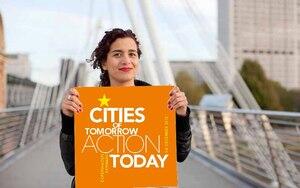The opening seminar was held in Brussels in April, a look back:
Elected representatives clearly have a key role to play in the sustainable development of European cities. What is less clear, though, is how they can develop their skills and practical knowledge in the field. To meet that need in the context of URBACT partner cities, a pilot training programme has been drawn up with the support of the European Commission.
Delivering Knowledge and Tools on Integrated and Sustainable Development
The aim of the scheme is to give representatives a better understanding of European urban policy, an insight into what integrated and sustainable development involves, and the practical tools needed for project management.
Not only will this help to inform their decision-making, it should also improve the quality of URBACT Local Action Plans and help to develop Local Support Groups. The benefits were summed up neatly by Beata Stepaniuk, a university lecturer and councillor in Lublin, Poland involved in the EUniversities project. "I hope this programme will help me to be a better politician in my city," she said. "There is a lot of detail in urban development and this is an opportunity to find out more about technical skills and putting that knowledge into practice."
The scheme comprises three sessions over the course of 2013, with a second seminar on developing a participative approach with stakeholders in September, and a third on sustainability and change in December. Attended by 30 mayors, deputies and councillors from 15 countries, April’s seminar focused on how to develop an integrated approach to urban development. Day One, which included some ice-breaking time for people to introduce themselves, was devoted to the basic concepts. A series of talks by experts, presentations of participants' Local Action Plans, and peer reviews/discussions came together as a series of common threads. And the crossovers were clear from the outset.
Read more on urbact.eu
Picture: URBACT Annual Conference - Copyright URBACT

